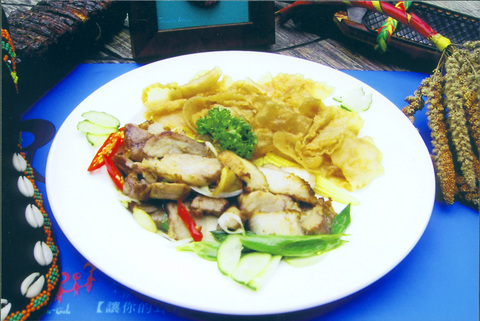Satisfying a vegetarian diet is seldom an issue at restaurants in Taiwan, but being a vegetarian can limit the variety of eating experiences you have here. Veggie alternatives to traditional indigenous dishes might taste delicious but will never be quite the same experience as eating the "real" thing, and this was confirmed on a recent visit to a Gulu Gulu .
A popular spot for authentic indigenous cuisine, Gulu Gulu was opened last year in Taichung city by Paiwan singer Chiu Jin-ming (
Other recommended dishes include Taimali's pig knuckle, which is pickled with spices and millet wine to give it a unique tart and salty flavor, said Chiu's wife, who also works at the restaurant.

PHOTO COURTESY OF GULU GULU
Several of the dishes can be ordered separately for light dining or late-night snacking, but the best way to sample as much as possible is to opt for a set meal, which includes a starter, soup, main course, dessert and beverage.
It isn't often that starters are the main attraction but a slice of ah vai was said to be an exception. Ah-vai is a traditional Paiwan dish prepared with sticky rice, pork and peanuts, and wrapped inside two large leaves, which absorbs some of the oil but retains its flavor. Both the ah-vai and spicy tofu-based dipping sauce it is served with are made by Chiu's mother and shipped weekly from her Taimali village in Taidong.
Every set meal includes a small glass of millet wine, and even if is not your drink of choice, it would be a shame not to try one glass of vava-yoyo or ma pu lao (a stronger version).
The restaurant is a small colonial-style house converted into a two-floor dinning area, which also doubles as a gallery space exhibiting aboriginal art works. Large driftwood sculptures and mural paintings are intermixed with black and white photographs, depicting some of Taiwan's indigenous villages.
On the first floor is a small stage for daily performances at 12:30pm and 7pm. Although the scheduled time is one hour, the music often continues or starts up again later in the evening.
On this particular occasion, Chiu was accompanied by costumers from other tables and took to the stage several times in a two-hour period. The restaurant gets busy during the weekend so reservations are recommended.

April 14 to April 20 In March 1947, Sising Katadrepan urged the government to drop the “high mountain people” (高山族) designation for Indigenous Taiwanese and refer to them as “Taiwan people” (台灣族). He considered the term derogatory, arguing that it made them sound like animals. The Taiwan Provincial Government agreed to stop using the term, stating that Indigenous Taiwanese suffered all sorts of discrimination and oppression under the Japanese and were forced to live in the mountains as outsiders to society. Now, under the new regime, they would be seen as equals, thus they should be henceforth

Last week, the the National Immigration Agency (NIA) told the legislature that more than 10,000 naturalized Taiwanese citizens from the People’s Republic of China (PRC) risked having their citizenship revoked if they failed to provide proof that they had renounced their Chinese household registration within the next three months. Renunciation is required under the Act Governing Relations Between the People of the Taiwan Area and the Mainland Area (臺灣地區與大陸地區人民關係條例), as amended in 2004, though it was only a legal requirement after 2000. Prior to that, it had been only an administrative requirement since the Nationality Act (國籍法) was established in

Three big changes have transformed the landscape of Taiwan’s local patronage factions: Increasing Democratic Progressive Party (DPP) involvement, rising new factions and the Chinese Nationalist Party’s (KMT) significantly weakened control. GREEN FACTIONS It is said that “south of the Zhuoshui River (濁水溪), there is no blue-green divide,” meaning that from Yunlin County south there is no difference between KMT and DPP politicians. This is not always true, but there is more than a grain of truth to it. Traditionally, DPP factions are viewed as national entities, with their primary function to secure plum positions in the party and government. This is not unusual

US President Donald Trump’s bid to take back control of the Panama Canal has put his counterpart Jose Raul Mulino in a difficult position and revived fears in the Central American country that US military bases will return. After Trump vowed to reclaim the interoceanic waterway from Chinese influence, US Defense Secretary Pete Hegseth signed an agreement with the Mulino administration last week for the US to deploy troops in areas adjacent to the canal. For more than two decades, after handing over control of the strategically vital waterway to Panama in 1999 and dismantling the bases that protected it, Washington has